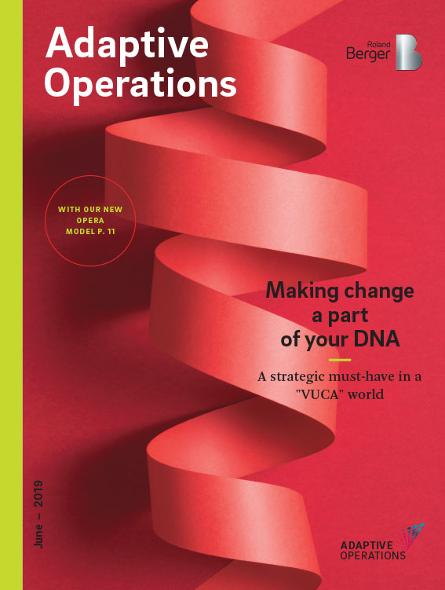How Adaptive Operations can help future-proof your company
![{[downloads[language].preview]}](https://www.rolandberger.com/publications/publication_image/roland_berger_adaptive_operations_download_preview.jpg)
Adaptive Operations are structured to be flexible and able to respond quickly to change. They allow companies to scale up in boom times and scale down in lean times.


"When the world around you is changing, you need to change with it. "
Many people say change comes quickly, but almost always, it casts a long shadow that could have been recognized by a multitude of signals.
For institutions that tend toward solidification and consolidation, change is experienced as fast and confusing.
These companies have lost the ability to respond to change in an appropriate matter. Instead of reacting organically and adaptively to external impulses and trends, they stay the course – to their own peril. In short, they are unable to co-evolve with their environment.
We believe one solution lies in Adaptive Operations, which are operations that are designed from the outset to permanently adjust at a fundamental level.
This means creating structures, business models and processes that can rapidly adapt when trends change or new scenarios present themselves. Structures are not designed as silos or in a linear fashion. Instead, the basic structure is a network, one in which speed, agility and capabilities count.
With the network structure, cross-functional, cross-company innovation processes can be initiated. And ideas that emerge and bubble in many different parts of the ecosystem will be able to take "short cuts" and bypass traditional gatekeepers, silos and hierarchies.
Another important part of Adaptive Operations is the transfer of decision-making processes and decision-making powers to the front lines. That's in sharp contrast to the standard, "safer" modus operandi of capturing data and sending it up the hierarchical chain for a decision to be made.
With Adaptive Operations, companies will be able to pursue multiple strategies in real time because a modular building block approach makes it easy to shift gears when necessary. Finally, making decisions based on incomplete information is a part of Adaptive Operations. The Pareto principle, or the 80/20 rule, will become the norm.
What we outline above is a major change, we know.
That’s why it’s critical to take on an adaptive mindset without losing the company’s core values. That can be done when change is seen as part of a company’s DNA.
Once implemented, Adaptive Operations can lead to significant savings through operational efficiency. Companies will be able to react to change without hardly missing a beat.
Roland Berger has developed guiding principles for robust and future-proof operations and aggregated them into a model we call OPERA 2030.
OPERA means: O-pen up operations, P-erfect your value chain, E-mbrace digital, R-eorchestrate value generation, and A-ccelerate the learning game.
![{[downloads[language].preview]}](https://www.rolandberger.com/publications/publication_image/roland_berger_adaptive_operations_download_preview.jpg)
Adaptive Operations are structured to be flexible and able to respond quickly to change. They allow companies to scale up in boom times and scale down in lean times.